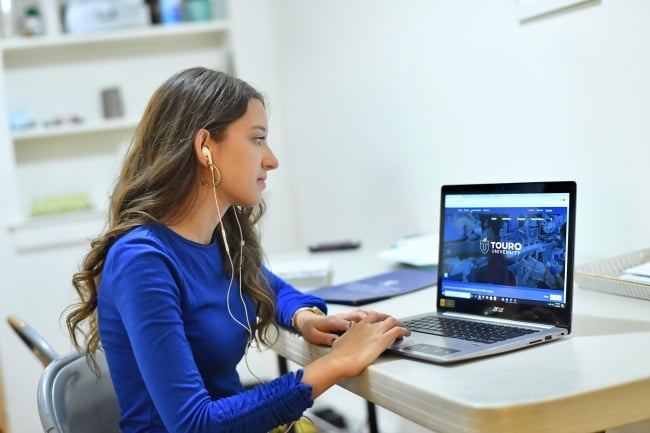You have /5 articles left.
Sign up for a free account or log in.

Touro University launched a graduate degree program in social work in 2023 that includes AI-assisted experiential learning simulations.
Touro University
The practicum is a critical piece of experiential learning for students entering health-care fields as they learn to navigate interacting with patients and providing professional care. At Touro University in New York, online learners in the master of social work program can practice before working with real patients thanks to a new generative artificial intelligence pilot.
The AI program is embedded in students’ courses, allowing them personalized and immediate feedback on their performance without the pressure of impacting patient care. The software also provides instructors with data on class performance and skills.
The initiative has proven beneficial in building students’ confidence and technical skills as they move into real client care.
What’s the need: The Graduate School of Social Work at Touro University launched a fully online master’s program in 2023, allowing students to take courses remotely, but students still needed a way to demonstrate practical application of their learning and clinical skills.
Clinical social work training is based on a competence model, so students must show they have learned specific skills and can apply them effectively using critical thinking and ethical principles.
To provide a new kind of experiential learning, Jamie Sundvall, director of the online master of social work program, led the adoption of an AI platform that simulates clinical visits with patients and requires students to apply what they’ve learned.
How it works: Touro uses Simucase Clinical Simulations’ simulated scenarios, in which students must navigate a conversation with a patient through selecting suggested prompts. Based on the student’s selections, the platform will give guidance on if that was a positive interaction or if students should consider a better response.
Each scenario models ethical decision-making and challenges that can come up in remote or online practice, such as a clinical assessment, which could be a therapy/agency intake, risk assessment, substance use assessment or general mental health assessment.
The platform produces individual performance reports in addition to the live feedback, which is also available to course instructors so they can evaluate students’ strengths or areas for improvement and growth.
Having this aggregated performance data from course participants can inform an instructor’s course content and illuminate where learners need additional lectures or demonstrations to improve skills.
One important consideration for the program was ensuring the AI pulled from a more closed source to prevent negative impacts to student learning, such as AI hallucinations biases against certain people, demographic groups or misinformation.
AI for Student Learning
College and university professors have found applications for generative artificial intelligence tools to provide engaging simulations for students to build skills in a safe online environment.
- Marketing students at Hult International Business School can practice working with AI-powered customers for market research before launching digital campaigns.
- Indiana University–Purdue University Indianapolis added virtual reality technology to the speech lab on campus, allowing students to engage with AI-powered audiences and interviewers to practice their public speaking and interview skills.
The impact: All students engaged with simulations in half of their foundation-year curriculum this past academic year.
Student evaluations from the year since launch have been positive, with comments noting the importance of practicing different approaches while using critical thinking and clinical communication skills in real time. Learners also have said they appreciated the immediate feedback and how it prepared them for working with live patients.
One scenario that was particularly beneficial for students was working with a young client who was expressing suicidal ideation. Learners could see when they should apply their practical knowledge versus considering the client’s needs, such as building rapport.
Another benefit was a boost in student confidence as they practiced without the stress of others observing them make mistakes or try different approaches. Practicum supervisors shared they also saw a difference in students who worked with AI prior to their in-person work because they made fewer “beginner mistakes,” with less impact to patients.
In the future, Touro plans to continue embedding tech into the student experience, including AI programs like a virtual professor who can answer clinical questions and interact with learners if the human professor is out of office or unavailable.
Do you have an academic success tip that might help others encourage student success? Tell us about it.




